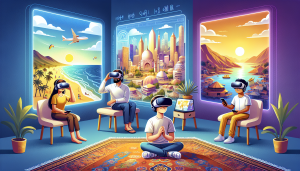 UseCasesFor.ai
UseCasesFor.ai
Choose Topic
 UseCasesFor.ai
UseCasesFor.ai
AI Use Cases
A collection of over 250 uses for artificial intelligence
A continually updated list exploring how different types of AI are used across various industries and AI disciplines,including generative AI use cases, banking AI use cases, AI use cases in healthcare, AI use cases in government, AI use cases in insurance, and more

Sign up
to receive a PDF containing all the use cases and stay updated with the latest AI trends and news (you can always unsubscribe)
Virtual reality tours

Introduction
In the tourism industry, technology has been a long-time partner in the improvement of the travel experience of tourists. This has been taken to the next level with the use of Virtual Reality (VR) whereby tourists are able to tour certain places in a more realistic and engaging way through VR tours. However, the game changer is the incorporation of Generative Artificial Intelligence (Gen AI) into these VR tours which enhance the experience to a great extent. Gen AI acts as a smart AI guide that can answer user’s questions, provide recommendations and go further to create a unique tour itinerary depending on the user’s interest.
Challenges
There are, however, several challenges that can hinder the effective integration of Gen AI in VR tours in the tourism industry. These vary from the technical difficulties such as developing authentic virtual scenes and environments as well as performance problems to the logistical challenges including the costs of development and accessibility. There are also questions as to whether the AI will be able to comprehend and answer diverse queries that users may have. Also, users will face challenges in using these virtual environments especially if they are new to VR. Also, the issue of data privacy and security is another crucial challenge.
AI Solutions
There are several solutions that are being developed to counter these challenges. AI algorithms for example the deep learning algorithms is used in generating of realistic virtual environments. For example, DeepMind of Google applies generative models to generate virtual scenes which are almost identical to the real-world scenes. AI also improves the user engagement in these environments as well. This is because Natural Language Processing (NLP) technology allows the AI to process and interpret language as it is used by human beings. The machine learning algorithms can learn about the user’s activities and his or her preferences to enhance the tour experience. Oculus and HTC are the companies that are striving to improve the VR technology and make it easier and more approachable to use, which, in turn, will help the technology to find its users. In order to address the issue of security, encryption and other secure network protocols are being adopted in order to protect data.
Benefits
There are many advantages of using Gen AI in VR tours. It makes the tour more engaging as well as informative for the users, and thus makes the tour more interactive and tailored to the user. It also enables tourists to visit such places which would otherwise be inaccessible or difficult to visit, including other countries, historical places, and even space. As for the tourism industry, it creates new sources of income since these VR tours can be an additional product. It also acts as a marketing strategy where the potential tourists are given a glimpse of what they are likely to expect. Also, it may assist in mitigating the negative effects of tourism on the environment through reducing the need to travel physically.
Return on Investment
It is possible to achieve a good ROI when integrating Gen AI into VR tours since there are many benefits that can be derived from it. Although it may be expensive to set up at the initial stage, these VR tours may be profitable and can generate good revenue. In addition, the enhanced user engagement makes the customers happy and likely to come back, thus increasing the revenue. These VR tours can also cut down on costs in other areas such as marketing and customer service since many of these functions can be automated by the AI. According to PwC, AI has the potential of adding up to $15.7 trillion to the global GDP by 2030 and the tourism sector is expected to benefit a lot from this.